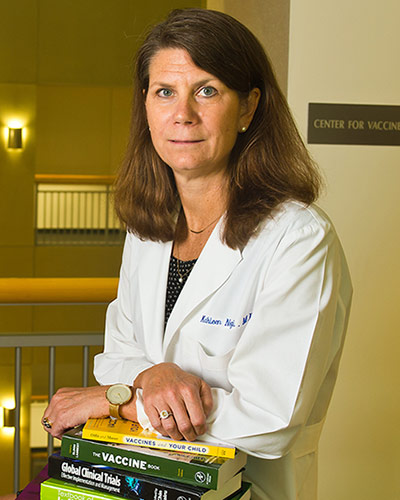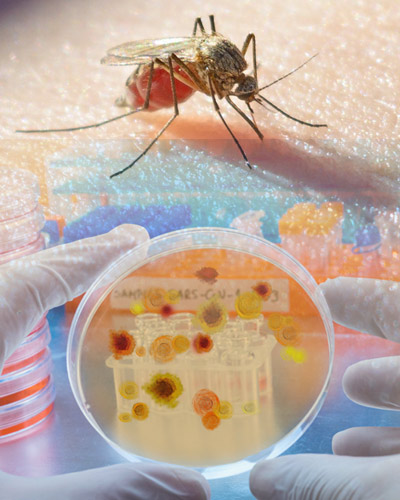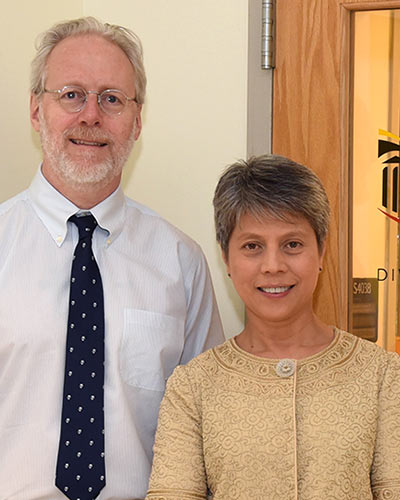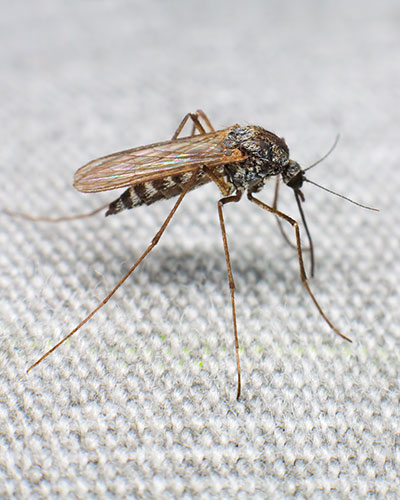February 24, 2017

University of Maryland School of Medicine Research Shows Vaccine’s Versatility
An experimental malaria vaccine protected healthy subjects from infection with a malaria strain different from that contained in the vaccine, according to a study published this week in the Proceedings of the National Academy of Sciences (PNAS). The research was conducted by scientists at the University of Maryland School of Medicine and the National Institute of Allergy and Infectious Diseases (NIAID), part of the National Institutes of Health (NIH).
The Phase 1 clinical trial is important because in places where malaria is common, there is usually more than one strain of malaria. To be effective in the real world, a vaccine must protect against more than one. The study’s lead researcher, Kirsten E. Lyke, MD, associate professor of medicine at the University of Maryland School of Medicine and a senior scientist at the Center for Vaccine Development, said the vaccine’s versatility was promising. “Our study shows that that this vaccine can protect against at least two strains of malaria,” said Dr. Lyke, who has studied malaria for more than a decade. “We need to continue our research, but this is a fantastic finding.”
Malaria is transmitted to humans through the bite of infected mosquitoes, which inject immature malaria parasites called sporozoites into a person’s bloodstream. The parasites travel to the liver, where they mature, multiply and spread via the bloodstream throughout the body causing malaria symptoms including chills, fever, headache, nausea, sweating and fatigue. According to the World Health Organization, 212 million people were infected with malaria globally in 2015 and 429,000 people died, mostly young children in Africa. The species Plasmodium falciparum is the most common cause of malaria morbidity and mortality in Africa. In the United States, travel-related malaria is a concern for international tourists, aid workers and military personnel worldwide.
The PfSPZ Vaccine used in this study was developed by Sanaria Inc., of Rockville, Maryland. The vaccine contains weakened P. falciparum sporozoites that do not cause infection but are able to generate a protective immune response that protects against live malaria infection. Earlier research with the vaccine found it to be safe, well-tolerated and protective for more than a year when tested in healthy U.S. adults against a single Africa-derived malaria strain matched to the PfSPZ Vaccine.
The study enrolled 31 healthy adults ages 18 to 45 years, and was led by Dr. Lyke and Robert A. Seder, MD, chief of the Cellular Immunology Section of NIAID's Vaccine Research Center (VRC). Participants were assigned to receive three doses of the vaccine over several months by rapid intravenous injection.
Nineteen weeks after receiving the final dose of the test vaccine, participants who received the vaccine and a group of non-vaccinated volunteers were exposed in a controlled setting to bites from mosquitoes infected with the same strain of P. falciparum parasites (NF54, from Africa) that were used to manufacture the PfSPZ Vaccine.
 Nine of the 14 participants (64 percent) who received the PfSPZ Vaccine demonstrated no evidence of malaria parasites; all six of the non-vaccinated participants who were challenged at the same time had malaria parasites in their blood.
Nine of the 14 participants (64 percent) who received the PfSPZ Vaccine demonstrated no evidence of malaria parasites; all six of the non-vaccinated participants who were challenged at the same time had malaria parasites in their blood.
Of the nine participants who showed no evidence of malaria, six participants were again exposed in a controlled setting to mosquito bites, this time from mosquitoes infected with a different strain of P. falciparum parasite, 33 weeks after the final immunization. In this group, 5 of the 6 participants (83 percent) were protected against malaria infection; none of the six participants who did not receive the vaccine and were challenged were protected. All participants who became infected with malaria immediately received medical treatment.
The research team found that the PfSPZ Vaccine activated T cells, a key component of the body’s defenses against malaria, and induced antibody responses in all vaccine recipients. Vaccine-specific T-cell responses were comparable when measured against both of the malaria challenge strains, providing some insights into how the vaccine was mediating protection.
Ongoing research will determine whether protective efficacy can be improved by changes to the PfSPZ Vaccine dose and number of immunizations. Accordingly, a Phase II efficacy trial testing three different dosages in a three-dose vaccine regimen is now underway in 5- to 12-month-old infants in Western Kenya to assess safety and efficacy against natural infection.
“Malaria remains an urgent global health problem, one that shortens far, far too many young lives,” said University of Maryland School of Medicine Dean
E. Albert Reece, MD, PhD, MBA, who is also the vice president for Medical Affairs, University of Maryland, and the John Z. and Akiko K. Bowers Distinguished Professor. “This vaccine has the potential to save millions of lives, and I am sure that these researchers will continue to collaborate on this exciting work.”
About the University of Maryland School of Medicine
Commemorating its 210th Anniversary, the University of Maryland School of Medicine was chartered in 1807 and is the first public medical school in the United States and continues today as an innovative leader in accelerating innovation and discovery in medicine. The School of Medicine is the founding school of the University of Maryland and is an integral part of the 11-campus University System of Maryland. Located on the University of Maryland’s Baltimore campus, the School of Medicine works closely with the University of Maryland Medical Center and Medical System to provide a research-intensive, academic and clinically based education. With 43 academic departments, centers and institutes and a faculty of more than 3,000 physicians and research scientists plus more than $400 million in extramural funding, the School is regarded as one of the leading biomedical research institutions in the U.S. with top-tier faculty and programs in cancer, brain science, surgery and transplantation, trauma and emergency medicine, vaccine development and human genomics, among other centers of excellence. The School is not only concerned with the health of the citizens of Maryland and the nation, but also has a global presence, with research and treatment facilities in more than 35 countries around the world. medschool.umaryland.edu/
About the National Institutes of Health (NIH)
NIH, the nation's medical research agency, includes 27 Institutes and Centers and is a component of the U.S. Department of Health and Human Services. NIH is the primary federal agency conducting and supporting basic, clinical, and translational medical research, and is investigating the causes, treatments, and cures for both common and rare diseases. For more information about NIH and its programs, visit www.nih.gov.
Learn More
• Center for Vaccine Development (CVD)
• Division of Malaria Research
Contact
Office of Public Affairs
655 West Baltimore Street
Bressler Research Building 14-002
Baltimore, Maryland 21201-1559
Contact Media Relations
(410) 706-5260
Related stories

Friday, October 17, 2025
New Monoclonal Antibody Shows Promise for Preventing Malaria Infections
Malaria remains one of the leading causes of death among children in sub-Saharan Africa, claiming more than 600,000 lives each year worldwide with limited efficacy in currently available treatments and vaccines. Now a new early-stage clinical trial found that a novel monoclonal antibody provided dose-dependent full protection against the malaria parasite with minimal side effects.

Tuesday, April 30, 2024
Miriam K. Laufer Appointed Interim Director of the Center for Vaccine Development and Global Health
The University of Maryland School of Medicine (UMSOM) Dean, Mark T. Gladwin, MD, announced that Miriam K. Laufer, MD, Professor of Pediatrics, Medicine, and Epidemiology & Public Health, has been appointed as the Interim Head of UMSOM's Center for Vaccine Development and Global Health (CVD).

Tuesday, April 30, 2024
Miriam K. Laufer Appointed Interim Director of the Center for Vaccine Development and Global Health
University of Maryland School of Medicine (UMSOM) Dean, Mark T. Gladwin, MD, announced that Miriam K. Laufer, MD, Professor of Pediatrics, Medicine, and Epidemiology & Public Health, has been appointed as the Interim Head of UMSOM's Center for Vaccine Development and Global Health (CVD).

Thursday, October 12, 2023
UM School of Medicine's Kirsten Lyke Elected as Member of Prestigious National Academy of Medicine
Kirsten E. Lyke, MD, Professor of Medicine and Physician-Scientist at the Center for Vaccine Development and Global Health (CVD) at the University of Maryland School of Medicine (UMSOM), was elected this week as a new member of the National Academy of Medicine (NAM). She was recognized for her pivotal research in emerging infections and human challenge models that have informed and shaped global vaccine and public health policy.

Wednesday, April 05, 2023
UM School of Medicine Researchers Chart Path Forward on Developing mRNA Vaccines for Infections Beyond COVID-19
After helping to develop and test new mRNA technologies for COVID-19 vaccines, University of Maryland School of Medicine (UMSOM) researchers and scientists are turning their attention to utilizing this innovative technology to ward off other infectious diseases like malaria and influenza. Last month, UMSOM faculty in the Center for Vaccine Development and Global Health (CVD) launched a new clinical trial to investigate the use of mRNA technologies to create a vaccine against malaria. CVD Director Kathleen M. Neuzil, MD, MPH, FIDSA also provided commentary in the nation’s leading medical journal on the feasibility of using mRNA to develop a universal influenza vaccine that could eliminate the need for seasonal shots.

Thursday, December 22, 2022
A Three-Dose Malaria Vaccine Shows Safety, Efficacy in West African Adults
A three-dose regimen of a whole-parasite vaccine against malaria – called Plasmodium falciparum sporozoite (PfSPZ) vaccine – demonstrated safety and efficacy when tested in adults living in Burkina Faso, West Africa, which has endemic malaria. That is the finding of a new study published Dec. 7 in Science Translational Medicine. Researchers at the University of Maryland School of Medicine’s Center for Vaccine Development and Global Health (CVD) led the work.

Monday, July 18, 2022
New Genomic Research Shows Why Testing Malaria Vaccines in the Clinic is as Rigorous as Natural Exposure in the Field
Malaria is the deadliest mosquito-borne parasitic infection of humans. In 2021, after a century of research, the World Health Organization (WHO) approved the world’s first malaria vaccine. That vaccine reduces the incidence of malaria infections in young children aged 5-17 months by only 30 percent, meaning that it remains critical to continue developing and testing more effective vaccines.

Wednesday, January 26, 2022
Trial Co-led by University of Maryland School of Medicine Scientist Confirms Safety of “Mix-and-Match” COVID-19 Vaccine Booster Dosing
A University of Maryland School of Medicine (UMSOM), Center for Vaccine Development and Global Health (CVD), expert is co-leading an ongoing study that was pivotal in recommending adults and teens receive booster COVID-19 shots of their choosing starting in fall 2021. The preliminary clinical trial results, reported today in The New England Journal of Medicine, found that is safe and effective to receive boosters that are the same or a different one from the person’s primary vaccine(s).

Tuesday, November 02, 2021
Unexpected Antibody Type Found in People with Malaria Infections
Malaria, a pathogen transmitted into blood by mosquitoes in tropical climates, is typically thought of as a blood and liver infection. However, in a newly published study, researchers at the University of Maryland School of Medicine (UMSOM) have detected antibodies primarily made in response to infections in the mucous membranes — in such areas as the lungs, intestines, or vagina — in study participants with malaria.

Sunday, October 28, 2018
American Society of Tropical Medicine & Hygiene Awards Dr. Miriam Laufer the LePrince Medal for Malaria Research
Miriam Laufer, MD, MPH, Professor of Pediatrics and Associate Director for Malaria Research at the University of Maryland School of Medicine’s (UMSOM) Center for Vaccine Development and Global Health (CVD), was awarded the Joseph Augustin LePrince Medal by the American Society of Tropical Medicine and Hygiene (ASTMH).

Thursday, May 04, 2017
UM School of Medicine Researchers Receive $9 Million Grant for Malaria Research
The University of Maryland School of Medicine has been awarded an International Center of Excellence for Malaria Research (ICEMR) grant by the National Institutes of Health’s National Institute of Allergy and Infectious Diseases (NIAID), one of seven ICEMRs awarded worldwide. With funding of more than $9 million over seven years, the grant will be used to research and develop new tools to help eliminate drug-resistant malaria in Myanmar and neighboring countries in Southeast Asia.

Wednesday, July 06, 2016
UMSOM Begins Malaria Vaccine Trial in Burkina Faso
Malaria is one of the world’s deadliest diseases: it infects hundreds of millions of people every year, and kills about half a million, most of them under five years of age.
